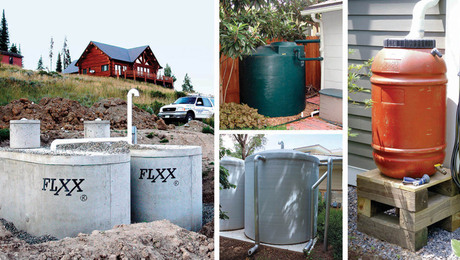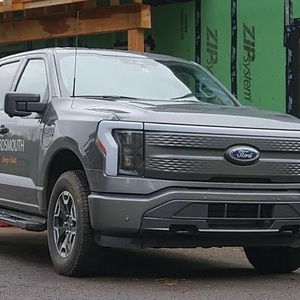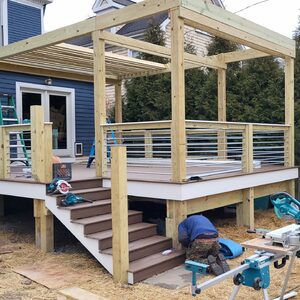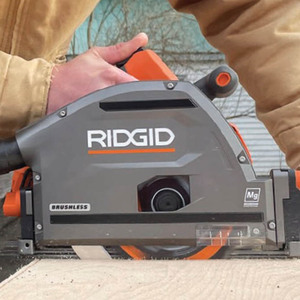What is the forum’s opinion on using a hot-water heater for a proposed radiant-heat system? or would a hot-water boiler be better. thx
Discussion Forum
Discussion Forum
Up Next
Video Shorts
Featured Story

There's a constant source of clean water for you to use, and all you have to do is collect it.
Featured Video
SawStop's Portable Tablesaw is Bigger and Better Than BeforeHighlights
"I have learned so much thanks to the searchable articles on the FHB website. I can confidently say that I expect to be a life-long subscriber." - M.K.

















Replies
Not sure what everyone else would say, but if I had gas, I'd have a dedicated water heater for the domestic hot water, and another water heater (or a heat exchanger on the first water heater) for the closed loop radiant floor heat.
I'm on oil heat, so I have an oil-fired boiler to heat the water, then a 4-way mixing valve to bring the temp back down for the RFH, to about 115 degrees. The RFH is still on a closed loop, separate from the domestic hot water.
Mongo
Check the efficiency ratings - boilers are A LOT more efficient than hot-water heaters.
Only reason to use a water heater is when you have a very small heat load, as they don't make boilers that small (though that's changing).
Good forums for info about radiant:
http://forums.invision.net/index.cfm?CFID=3470907&CFTOKEN=5b2276f-1128b810-1c25-4bf5-ba16-0a2add580f0e&CFApp=2&reset=Y
http://www.terrylove.com/forums/index.php?s=9e254fe0a05df597ab0d1129789575ae
http://www.healthyheating.com/bb2/index.php
http://radnet.groupee.net/eve/ubb.x/a/cfrm/f/2771065301
Typical tank water heaters have bang-bang controllers -- they are either full on or full off and that tends to waste fuel when heating water in a loop. Modern boilers have modulating valves that allow them to operate more efficiently. The newer units also have controllers with features like outdoor reset and direct integration with thermostats and flow valves, something a water heater won't have.
You can put together a reasonable low-temperature heating system with a water heater, but by the time you consider the cost of the extra parts and labor and the lost savings for fuel costs, it might actually be better to go with a boiler designed specifically for that use.
If a heater will work for you it may be the way to go. Boilers often have required inspections and other requirements (manditory insurance, etc.) that can increase their cost over time. These things are rarely mentioned or figured into the cost of systems.
The answer is "It depends on the application."
Depending on where you live, what your going to heat, how it is going to be used, etc., etc.
For a small area that doesn't require a great deal of heat input (the smalles boilers I know about are 50,000 btu/hr, which will heat 1500 square feet or more) a water heater is an inexpensive option. Gas water heaters are very inefficient, usually about 60% for the cheap ones. A good, high efficient domestic water heater approches both the efficiency AND the cost of a heating boiler.
Less expensive boilers operate at higher temperatures than most floor heating systems use and require an experienced installer to work properly. Condensing boilers can tolerate lower temperatures and are 95% or more efficient, but cost much more. A water heater has an internal thermostat, is made for cold water "return" and is pretty much hard to screw-up. The down side is that a domestic water heater used to heat water lasts 10 to 15 years, in a heating application with much higher use and cycling, that will be somewhat if not greatly reduced. Boilers, if maintained, last indefinitely, or so it seems (I've seen and worked boilers over 70 years old!).
Tim is dead on.Basically, for low heating loads and low water temps, the water heater can be a good choice.the higher the load, or the higher the temp, the more a boiler makes sense.Generally speaking, for any full home system in a real heating climate, a mod/con boiler would pay for itself vs a gas water heater. In oil.. perhaps a bit more negotiable.Though Tim, water heaters in heating applications typically last longer than pure DHW usage, not for less time. They do cycle more, but the water is moving as well and apparently that reduces sediment build up and sediment "aggression". In a closed system, it should be even better, though I am told that letting it sit cold all summer isn't so great either if it's filled with water. I haven't personally seen much that way, but then, I don't usually see systems in which a tank water heater is the best choice either!That said, the new "phoenix" modulating/condensing water heater looks pretty promising. Won't save you any money up front, but it's basically a mod/con boiler with a built in buffer tank.. pretty sweet!-------------------------------------
-=Northeast Radiant Technology=-
Radiant Design, Consultation, Parts Supply
http://www.NRTradiant.com
Rob, Who makes the Phoenix water heaters?
Not to hijack the topic, I was at a local p&h store this AM and was discussing the Weil-McLain high efficiency (Ultra series) boiler and their claims. Seems that per the salesman the new boiler (he said both WM and Bondurus were both experiencing early failures of the aluminum heat exchangers. He went on to say they were failing usually in the 10 year range and for the 2-3x cost were not cost effective to go from the 87% to the 93 & range. He also went on to say that most of the manufactures only have a 12 warranty on the heat exchanger and of course if the unit fails you new heat exchanger is only on warranty from the original purchase, so you may only be covered for another year ot two.
The reason I was at the store was to pickup a new igniter for the WM Gold gas boiler, I keep a spare on hand and this is the second one to fail in 10 years or so. The counter person also informed me that if you have feed air from the garage that if dust or dog hair etc. is sucked in by the blower it can cause the igniter to fail if it lands on the electrodes and then will short out the unit. Not sure if I had ever heard of that happening but that blower has a pretty good suction, might be a good place to put a small furnace filter just in case. BTW the spare saved me call out on Sunday eve. when it was -5. Never had one fail when the weather was warm.
Jim
That is the chance you take when you install these relatively new hi-tech boilers. The Ultra is a masterpiece of design if it doesn't break. If it does, you can kiss your fuel savings $$ goodbye.
I have always maintained that you have to determine whether you want to save fuel or money. Most boilers will give you one or the other.
Weil Mclain warrants the aluminum heat exchanger for 15 years. But, if you read the fine print, there is a stiff pro rating for the years you used the boiler before the heat exchanger failed. Unless it fails early on, you will end up paying most of the cost for a new one.
It also depends on the type of heating equipment you have in your home. If you have large mass heaters such as slab heat or heavy cast iron radiators, you probably won't benefit from some of the features of these super high tech boilers anyway.
I would wonder where he is getting his timeframes from, since as far as I know the europeans are not seeing mass failures early on and mod/cons haven't been in use over here long enough to figure out a track record yet.I will say that a) you don't usually get your AFUE rating on a conventional boiler, so assuming you are going from 83% is generous and b) the extra $1000 for a mod/con boiler, maybe $1500 generally pays for itself in a very reasonable timeframe on an appropriate system.If you're running an all low temp system where mod/con efficiencies start hitting the high 90's, you'll be able to afford that replacement with money to spare.-------------------------------------
-=Northeast Radiant Technology=-
Radiant Design, Consultation, Parts Supply
http://www.NRTradiant.com
Heat Transfer Products, makers of the munchkin. Basically a redesigned Voyager tank w/a Munchkin modulating burner... It's brand new, so it probably has some bugs, but I'm excited to try it out.-------------------------------------
-=Northeast Radiant Technology=-
Radiant Design, Consultation, Parts Supply
http://www.NRTradiant.com
The reason to shy away from a boiler, from what I've read, is that you simply don't need the high temperatures that a boiler provides for a radiant system. Am i wrong in this? I'm strongly considering a high-effiency condensing water heater like a polaris.
the mod/cons are built for low temperature, cost about the same a polaris, and perform far better and more quietly. If you use their outdoor sensors, you shouldn't even need to mix down water temps if you do a one temp system; the boiler could spit out 130, 115, even 100 degree water or cooler if desired.The polaris makes a heavy efficiency claim, but in actual use I am not particularly impressed. If you don't run them very hot (i.e. so they don't condense, which is how they are supposed to be so efficient) then they fry out their igniters a lot. Several years ago, compared to a conventional boiler, the polaris still stacked up pretty well. But compared to a mod/con boiler, the polaris is quite simply outclassed and overpriced.That newer Phoenix water heater mod/con I mentioned looks like it may have finally gotten it right, and if so, it could be a really great choice. But until that is borne up in the field, the mod/con boiler beats the polaris every single time, hands down, for what should be a similar price in the end.-------------------------------------
-=Northeast Radiant Technology=-
Radiant Design, Consultation, Parts Supply
http://www.NRTradiant.com
Rob,Concerned with oil-fired here.What are you looking at these days as one of the better options (overall efficiency, reliability, lifespan costing) for providing heat for a closed system low-mass RFH system, as well as domestic hot water?Natural gas is not an option, LP is but it's $$$$$.Burnham/Beckett combo's are still the choice du jour of the installers around here. I'm looking ofr new ideas.Thanks, Mongo
well, I dislike oil. But, oil boilers can do well with intelligent mixing/boiler control. I would almost never use one without tekmar controls.I would do a separate hot water system though; heating up a big ol oil boiler for a maintenance demand on a storage tank is not terribly efficient. A low mass boiler, like the System 2000 or others, may not be as bad there.-------------------------------------
-=Northeast Radiant Technology=-
Radiant Design, Consultation, Parts Supply
http://www.NRTradiant.com
Agreed.I've been using tekmar.I've previously looked into the System 2000, this topic is going to be one that I'm going to try to gather more info about at the upcoming JLC trade show. Hopefully it won;t be too difficult to wade through the propaganda.Thanks for the ideas.Mongo
Take a look at a Viessmann vitola. Cast iron, and can handle low return temps with no mixing. You can fire it without the pump running and it won't hurt it.
Edited 3/14/2007 10:27 pm ET by rich1
I appreciate that, thanks a lot.Mongo
"The reason to shy away from a boiler, from what I've read, is that you simply don't need the high temperatures that a boiler provides for a radiant system. Am i wrong in this? I'm strongly considering a high-effiency condensing water heater like a polaris."Most modern boilers have variable output temperatures. For radiant floor heat you just dial in a lower temperature.
Most cast iron/steel boilers need a minimum return temp of about 140, which means a supply of about 160. Much higher than what most rfh systems need.
There are a few exceptions.
Yes there are exceptions -- iron isn't the only option. We installed a Baxi boiler (Luna 310fi) that is continuously adjustable for any loop temperature from ambient to 185F. Our system runs baseboards but it could just as easily be set to run in-floor loops at 85F. It replaced an old cast iron rust bucket boiler and tank water heater and over the past three years we've reduced our NG consumption by about 15% compared to what we were burning in the old setup. http://www.wallhungboilers.com/prod_baxi_noncondensing.html
A boiler with a control system (tekmar or equivilent) can circulate the hot water based on the information the controller receives from the out door sensor. The key advantage is that the boiler may continue to circulate the water as long as the thermostat is calling for heat and the boiler does not necessarily need to be burning gas or warming the water. The two setups for using an instantaneous water heater I've seen did not allow this. They only would circulate water as the heater was firing. If you have cold winters like I do, this realyy costs you money.
Have a good day
Cliffy
P.S. There is an interesting article in the current JLC about a builder that did his own house heating with an instantaneous heater, but I would not trade in my boiler!
Edited 3/13/2007 2:54 pm ET by cliffy
patO
I have a water heater for my in floor radiant heat but I haven't got it fully hooked up yet. (very long story, don't ask unless you are really prepared to be bored) during debates with some on this subject they convinced me to get a boiler.
My brother-in-law has a boiler he wants to get rid of, he's going to electric hot water because our electric rates are very low and likely to remain low for the foreseeable future.. (at least compared to gas) The reason he's going to electric hot water instead of the boiler is that the boiler doesn't work well at lower temps, and at the higher temps it puts out the system doesn't work as intended. Given all that and the fact that I have a high efficency furnace as back up already plus a seperate water heater for domestic hot water the boiler would be the fourth redunant heating source in the house.